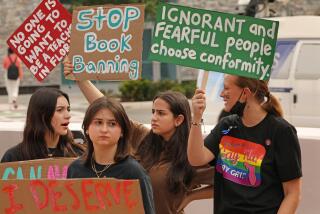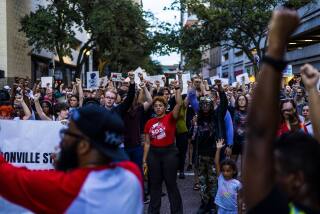1st Amendment Protects Even the Ugliest Among Us
- Share via
When my mother was growing up as the child of Italian immigrants in Yorkville, Ohio, she would sometimes go to bed at night with a burning cross glowing on a nearby hill. She quickly learned that the crosses were torched by the local Ku Klux Klan chapter for the benefit of all the immigrant families--a reminder of their tentative existence in their new country.
The burning cross--taken from ancient Scottish clans--remains as a virulent symbol of hate and division. This was evident in California when two people were charged Aug. 19 with the hate crime of burning a 6-foot cross on the lawn of a Lompoc police officer. Like many states, California has criminalized cross-burning.
However, the future of this law and similar laws across the country will soon be addressed by the Supreme Court. In Black vs. Virginia, a convicted KKK member is seeking to protect this vile practice. And he happens to be right.
In 1998, KKK Grand Wizard Barry Elton Black of Johnstown, Pa., was prosecuted for burning a 30-foot cross on the property of a willing owner in Virginia. As in 12 other states and the District of Columbia, Virginia outlawed the burning of crosses used “with the intent of intimidating any person or group of persons.” In the ultimate example of circular language, Virginia limits the crime of cross-burning to such intentionally intimidating acts but then states that the burning of any cross is “evidence of an intent to intimidate.”
The curious language was an attempt to get around a 1992 case in which the Supreme Court struck down a St. Paul, Minn., ordinance that criminalized the “placing on public property ... of a burning cross” as well as other hate symbols. In this case, racist teenagers had burned crosses on the lawn of a black family as well as across the street. While the court agreed that the law was unconstitutional, it fractured on the reason why.
Confusion has reigned among the states since the decision. Courts in Maryland, New Jersey, South Carolina and Virginia have struck down laws prohibiting cross-burning, while courts in Florida, Washington and California have upheld them.
In some ways, plaintiff Black is the unwanted bill that periodically comes due for the enjoyment of free speech. It is one of the great ironies that our most valued constitutional right often depends on the protection of our least valued speech. In the 1st Amendment, the majority is denied the right to choose between types of speech, even when the message is intended to show contempt or hatred of the majority. This is why the burning of a flag is both an unspeakable outrage and a protected right.
Of course, from the very beginning of the republic, citizens have yielded to the temptation to silence obnoxious or unwanted speech. Even President John Adams, heralded in a recent book as the very progenitor of liberty, used the Sedition Act to ruthlessly prosecute political rivals who criticized the government.
The most potent speech is often found in the display of symbols. Symbolic speech, such as the burning of a flag or a cross, is intended to convey an instant message to supporters and opponents alike. It has been such symbols that have attracted the greatest ire of the majority.
During the Red scare, the government arrested people for displaying a red flag. During the Vietnam War, the government cracked down on the wearing of black armbands by peace protesters. In more recent years, efforts were made to prohibit the showing of a swastika in a Jewish neighborhood.
Black and his small cadre of racists gathered on private property to light a cross and stoke their inner demons. Whatever danger they represent to our social harmony, suppressing them represents a far greater danger for our democracy. We are left with an American paradox.
Black is allowed to struggle each day to keep hate alive, while those he condemns work to protect his free speech. That is our own symbol on the hill, as personified by Black’s ACLU attorney, David Baugh, who is African American.
Virginia Atty. Gen. Randolph Beales in the Black case has stressed that there is no intrinsic value in the burning of crosses. Adopting the label du jour, Beales has declared cross-burning to be “domestic terrorism” and stated that it is “intolerable in any free society.” Yet what is intolerable in a free society is the denial of freedom. It is not that cross-burning has social value. It is the right to speak freely that has social value.
*
Jonathan Turley teaches constitutional law at George Washington University Law School.
More to Read
Get the L.A. Times Politics newsletter
Deeply reported insights into legislation, politics and policy from Sacramento, Washington and beyond. In your inbox twice per week.
You may occasionally receive promotional content from the Los Angeles Times.










